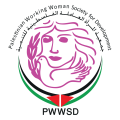
Towards the Implementation of a Palestinian Personal Status Law based on Full Equality

Palestinian Working Women Society for Development’s campaign on the margin of the "16 Days of Activism Against Gender-Based Violence" global campaign, 25.11.2018 - 10.12.2018
Brief Context
Gender-based violence in Palestine is interchangeably associated with patriarchal structures and asymmetric gender relations; yet more importantly is systematically constituted by the Israeli occupation and its persistent violations against women’s rights.
The violence of the military occupation has inevitable repercussions on Palestinians’ economic, social, political and civic rights. However, the traditional patriarchal norms and values continue to perpetuate because of a set of in effect laws in Palestine that fail to protect women and safeguard their lives; amongst them are the Family Protection law, Penal law and Personal Status law. From a social perspective, failing to provide to their families, Palestinian men tend to channel their anger and frustration towards women, since they look at them as subordinates. This reality contributes to distorted family dynamics and the regard to women as subordinates with socially defined gender roles.
Problem Analysis
For a fact, laws in Palestine are prejudicial against women and regenerate vicious cycles of GBV. More specifically, the Personal Status Law that regulates almost everything related to marriage, divorce and inheritance (along with alimony, custody, guardianship, among others) is a most unjust law that threatens the well-being of families in general and women more specifically. It is out-dated and inadequate to find solutions for many contemporary problems, especially those relating to women's rights and humanity, their relationship with their husbands and children and even their ability to testify before the Shari'a courts. After 1948, what has become the West Bank followed the Jordanian laws, and ultimately the Jordanian Personal Status Law of 1976. As for Gaza, what is in effect is the Family Rights Law (303) that came out in 1954 and that is based on the Ottoman Personal Status Law 1919. These two laws are formal laws enacted by state authorities and adjudicated in state-administered sharia courts. These courts are presided over by the Chief Justice of the Higher Sharia Court. However, these laws depart from international human rights norms in several areas, notably from CEDAW which the State of Palestine ratified in 2014.
Description of Campaign
From 25th of November (International Day for the Elimination of Violence against Women) till the 10th of December (Human Rights Day, the “16 Days of Activism against Gender-Based Violence” Campaign takes place across the globe to call towards ending violence against women and girls. The international campaign originated from the first Women's Global Leadership Institute coordinated by the Center for Women's Global Leadership in 1991. This year, PWWSD’s campaign focuses on Personal Status Law because it is relevant to GBV, notably in shaping the dynamics of relations of women with their families and regenerating asymmetric gender relations. Moreover, continuous efforts are required to redress the in-effect laws in Palestine that reinforce discrimination and “ownership” of women by men.
Direct Target Group
- Women and young women members of the 88 shadow councils created by PWWSD since 2013, PWWSD staff and young peers from counterpart organizations, young advocates and activists.
- Representatives of the cabinet and respective ministries and relevant governmental entities.
- Women, girls, men and boys in Palestine who are main actors in combating GBV and creating sustainable just peace and security for women and girls in Palestine.
Indirect Target Group
- Local politicians, political parties, intellects, public figures, academics and media personnel.
- CSO and mainly women rights organizations, and human/women rights defenders.
The overall objective of the campaign is to contribute to the global voice that calls to end violence against women and girls around the world. More specifically, PWWSD aims at:
- Sharing narratives and voices of Palestinian women whose rights have been violated because of the out-dated, inefficient and discriminatory Personal Status Law.
- Stimulating the readiness of the Palestinian male population to show support for women and the elimination of GBV, especially in areas related to marriage and divorce.
- Increasing the knowledge of relevant stakeholders on the Personal Status Law, its weakness, adaptation in different areas of Palestine, and how to proceed with lobbying towards the enforcement of the modified draft.
- Holding to account the first and main actor responsible for endorsing a modified project related to personal status law.
Main Activities
|
|
Activity |
Place |
Date |
|
1 |
Awareness Activities |
||
|
1.1 |
A seminar for young women leaders and activists by a specialist in Personal Status Law. |
PWWSD Office, Ramallah, Al-Anbia Street, Real Estate Company Building, 3rd floor |
25.11.2018 @ 11h00 |
|
1.2 |
Awareness session and a silent national pause, for the members of the PWWSD’s shadow councils. |
Nablus, Jenin, Tulkarem, Ramallah, Bethlehem, Hebron, and Gaza |
28.11.2018 @ 11h00 |
|
1.3 |
Symposium through joint collaboration with academics, activists, jurists, media representatives, government officials and specialists in personal status law |
Ramallah , Municipal Theatre at Ramallah Municipality
|
10.12.2018 @ 14h00 |
|
1.4 |
Virtual awareness and advocacy campaign |
Facebook: PWWSD Women Rights- Twitter: PWWSD Women Rights, @PWWSD7 |
Throughout the Campaign |
|
1.5 |
Motorcycle Performance |
Ramallah |
10.12.2018 |
|
2. |
Accountability Activities |
||
|
2.1. |
Accountability session via direct confrontation with the cabinet on the compliance of Personal Status Law with CEDAW, or members of the Parliament along with representatives from CSOs. |
Ramallah, Ramallah Chamber of Commerce
|
03.12.2018 @ 11h00 |